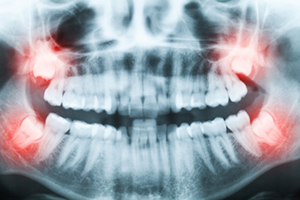Wisdom teeth are the last set of teeth to come through the back of your gums. Each person typically has four wisdom teeth, one in each corner of the mouth. Often, there is not enough space for these teeth in the mouth so when they finally emerge, it’s common for the teeth to be impacted. This can cause significant pain, infection, and other serious dental problems.
We are always on the lookout for the development of wisdom teeth in young teens’ mouths because we want to determine whether or not there is enough room for the teeth to reside without causing issues. To avoid potential dental problems, it may be recommended to have some or all of them removed through a wisdom teeth extraction procedure.
Why Would Wisdom Teeth Need to Be Extracted?
Wisdom tooth removal is often needed because these teeth frequently come in at an incorrect angle and many people do not have enough room in their mouth for them, otherwise known as an impacted tooth. When we say that a tooth is going to be impacted, what we mean is that as the tooth erupts from the jaw, it will come into contact with another tooth or dental structure that it should not contact leading to overcrowding in the mouth.
Problems That Arise From Impacted Wisdom Teeth
Having an impacted wisdom tooth may not have any negative effects, but most wisdom teeth cause several problems in your mouth. Impacted wisdom teeth can lead to problems such as:
- Cysts – Wisdom teeth develop in a sac within your jawbone, and if the sac fills with fluid, a cyst will form around the tooth. These cysts can damage other teeth, bones in your jaw, and even the nerves in your mouth.
- Decay – Wisdom teeth are at a higher risk for tooth decay because of their location in your mouth. These third molars are located all the way at the back of your mouth, which can be difficult to clean. Food and bacteria often get stuck back there and cause decay.
- Pain – Not only is it painful when wisdom teeth begin to emerge, but they can cause pain throughout the rest of your mouth as well. The impacted tooth can cause swelling and inflammation which results in pain.
- Gum disease – Because of the location of wisdom teeth, it can be hard to get a toothbrush or floss back there to properly clean. Teeth that can’t be properly cleaned are at a higher risk for developing gum diseases like pericoronitis. Pericoronitis occurs when the gum tissue around your wisdom teeth becomes swollen and infected.
- Damage to other teeth – A wisdom tooth that pushes against the second molar can cause damage or increase infection in that area. Wisdom teeth also cause overcrowding in your mouth that may shift the placement of other teeth which may require further treatment to correct this issue.
Wisdom Teeth Extraction Recovery
Your wisdom teeth extraction recovery is a top priority of ours. Removing impacted wisdom teeth will be a major surgical procedure and following the proper post-operative care will be vital to successful healing. Several instructions will be provided by your oral surgeon post-procedure. This will include information regarding pain management, proper cleaning, swelling, bruising, and bleeding, along with what foods, beverages, and activities are appropriate during your wisdom teeth extraction recovery.
If you are experiencing severe pain, swelling, or heavy bleeding for 2-3 days after your procedure, or if you think you are reacting poorly to the medication you were prescribed, please call our office right away.
Get In Touch with Dr. Redlinger
You can learn more about wisdom teeth removal. Or if you live in or near Reno, NV, please call us today at (775) 238-9770 or click on the button below to schedule an appointment.









